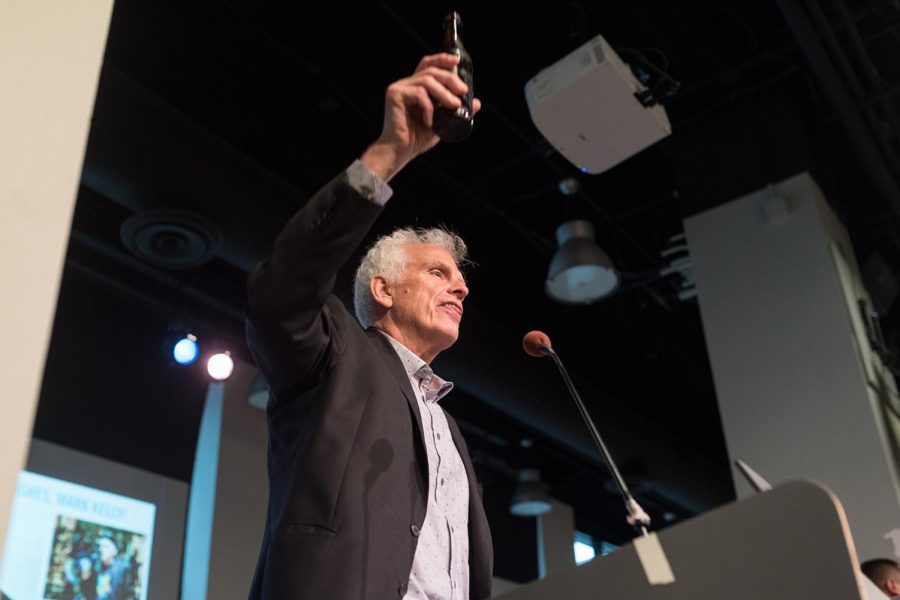Kelly shares final ‘Hell Yeah,’ says goodbye to college community
Kelly shares final ‘Hell Yeah,’ says goodbye to college community
July 29, 2016
Students and the college’s top administrators alike gathered to share both sadness and joy as Vice President of Student Success Mark Kelly said goodbye to “his home” at the college before beginning his new position with the City of Chicago.
The send-off party—held July 28 at the Conaway Center, 1104 S. Wabash Ave., one of the student spaces Kelly helped develop during his time as an administrator—was Kelly’s final honor before leaving the college after 32 years. He starts a new job as commissioner of Chicago’s Department of Cultural Affairs and Special Events, as reported July 7 by The Chronicle.
“The greatest gift of working at Columbia: how many people do you think get to go to their jobs where every day they get to see the joy of students developing, moving, shaking and becoming something other than what they were?” Kelly said. “What could be better in life? I’ve had 32 years of that.”
Sharon Wilson-Taylor, associate vice president and dean of Students who will temporarily serve his former position while the college conducts a national search for a replacement, joked with the crowd and Kelly about all of the things the staff talked about “behind his back.”
“Every time you say ‘new initiative, no budget,’ we roll our eyes saying, ‘Here we go again,’” Wilson-Taylor said. “But we always seem to pull it off. You [also] always walk around campus and drop by people’s offices. That’s called the ‘Mark Kelly drive-by.’ Then, when you took your trip to Mount Kilimanjaro, we were so sad and concerned for your safety, and we knew you were going to bring back a tabernacle of initiatives and ideas for us. We said, ‘Oh god, help us.’”
With Kelly’s passion for directly dealing with students and President and CEO Kwang-Wu Kim more formal leadership role, Kim said the two made an agreement to work through different avenues to improve student experience. Kim added that Kelly arrived at the college when campus culture did not exist, and under his leadership, pushed for more student-based opportunities.
“Mark is the person who really pushed this college to think about, ‘what does it mean for this school to have a sense of a campus and campus culture?’” Kim said in an interview with The Chronicle. “I think his pushing is finally yielding some different kind of place, so I really give him the credit for that inspiration and never letting that go.”
Kim reflected on the time he first met Kelly more than three years ago, shortly after being hired before the Fall 2013 Semester. During their first interactions, Kim said, they both tried to best understand each other and how the other works within the college.
“I’m looking at this tall, gangly man, and he’s looking down at me. I’m sure we were both thinking a version of the same thing: ‘who is this guy?’….” Kim said. “We were like two dogs—maybe a Great Dane and a Chow-Chow—sniffing each other out for a while.”
As each speaker presented Kelly with a gift, which included the college dedicating the 916 S. Wabash Ave. Building’s mural titled “We Own the Future”—one of their first murals that now make up the Wabash Arts Corridor—Kim also announced a Mark Kelly Scholarship will be annually offered beginning in the Fall 2016 Semester to a student who shows “exemplary leadership” skills.
Kaela Ritter, Student Government Association president and senior business & entrepreneurship major who joined several student attendees, thanked Kelly for his leadership among students, admiring his “sacrifice” and “compassion for the students.”
“The principles for student success he’s instilled in all of us will go on through us throughout our lives and careers,” Ritter said.
Before ending with a “Hell Yeah” chant to model his famous “Hell Yeah” Liturgy held at the college’s annual Convocation, Kelly also discussed his plans to continue growing the city as a major cultural space, adding that Columbia will be “the best partner” in future endeavors.
“Here’s what I plan to do [as commissioner] in its simplest form: be as fierce as I was at Columbia; that the creative forces of the city become more vital and central to the lives of our citizens; that the artists, colleges and nonprofits feel like they have the wind with them in their sails, and we deliver something that is so necessary,” Kelly said. “Is art going to save this sometimes violent, very segregated city? No, but it’s something that we forget is as important as the air we breath. The human species needs cultural vitality, and it sustains us, though we can forget it.”








